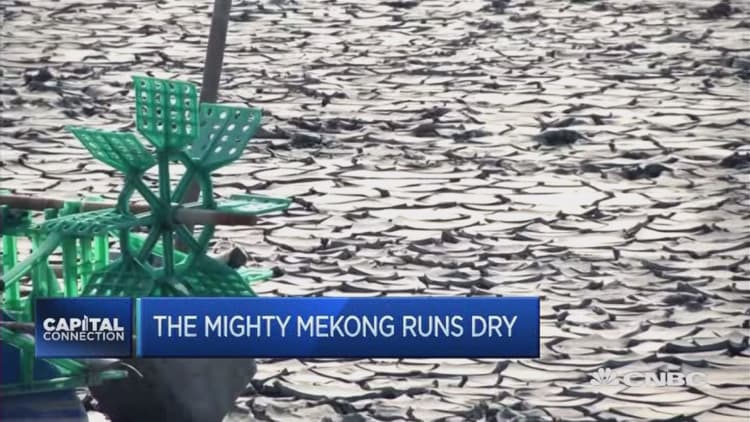Southeast Asia is suffering from the worst drought in more than 50 years but the issue looks set to fall off the agenda at a key meeting of the region's political and financial leaders this week.
The two-day World Economic Forum (WEF) for the Association of Southeast Asian Nations (ASEAN) kicks off in Kuala Lumpur on Wednesday, with heads of state from various ASEAN member countries, including Malaysia, Cambodia, Vietnam and Indonesia slated to attend.
The big topics on this year's official program include economic growth, trade, digital innovation, infrastructure, and gender rights. But in a region where the bulk of citizens rely on agricultural income, food security and weather challenges were noticeably absent from the agenda.
"Tackling the impact of drought in Southeast Asia is not on the WEF agenda and needs to be addressed at ASEAN ministerial meetings to galvanize an ASEAN policy response," said Rajiv Biswas, Asia-Pacific chief economist at IHS Global Insight, in an e-mail to CNBC.
The weather phenomenon known as El Nino has created a crippling heat wave and water shortages across the region, with temperatures hitting well above 40 degrees Celsius. That threatens dire economic losses for the ASEAN countries, with rice output plummeting in top producers Thailand and Vietnam, which has seen around 230,000 hectares of rice ruined so far this year, Reuters reported. As a result of the drought, the International Grains Council estimates a 9 percent drop in global rice stocks to 473 million tons this year, from 479 million tons in 2015.
During an informal meeting at last week's World Humanitarian Summit, ASEAN ministers committed to conducting a thorough study on the situation to come up with solutions and preventive measures.
But economists like Biswas argue governments need to give higher priority to policy responses to mitigate the impact of future droughts.
What’s needed
As climate change threatens resource security and availability, investment into research and development can't be ignored, according to Matthew Morell, director-general of the International Rice Research Institute.
"From 2010-2015, over 95 percent of funding for rice research came from non-ASEAN governments, mostly from the West," he stated in a recent report. "ASEAN should seize the opportunity to drive the next Green Revolution and secure its own future food needs through increasing funding support for agriculture R&D."
Policymakers must also focus on boosting agricultural productivity, researchers at Singapore's Nanyang Technological University warned in a note last week.
"The ASEAN region collectively has about 69 million hectares under arable agriculture and 44 million hectares under semi-permanent crops like palm oil and rubber but overall, the ASEAN per capita arable land area is 0.12 hectare, among the smallest in the world."

The use of genetically modified crops can also aid governments to reduce net food imports and become more self-sufficient, the note added. The authors pointed to data by the International Service for the Acquisition of AgriBiotech Applications (ISAAA) that showed an average 68 percent increase in incomes and profits for 18 million small farmers who adopted biotech crops during 1995-2014.
Increased collaboration between the public and private sectors is also needed, such as agribusiness initiatives, to help small farmers towards entrepreneurship, the note said. These initiatives can be partnerships between international organizations, companies, government agencies and the ASEAN Secretariat, starting with corporate social responsibility projects and leading to strong business alignments, it explained.
The use of farm insurance to protect incomes of farmers from the devastating effects of drought is also essential, Biswas warned, referring to the rampant issue of farmer suicides across ASEAN nations.
On a brighter note, the region's ambitious economic integration program, known as the ASEAN Economic Community (AEC), is expected to herald fresh potential for food security solutions.
"Where successful, AEC mechanisms can create sustainable food systems and reduce environmental stresses through best-practice collaboration, improving research, and creating trade links that allow countries to play to better develop their natural capital," explained Jackson Ewing, director of Asian Sustainability at non-profit think tank Asia Society Policy Institute, in a report last week.

